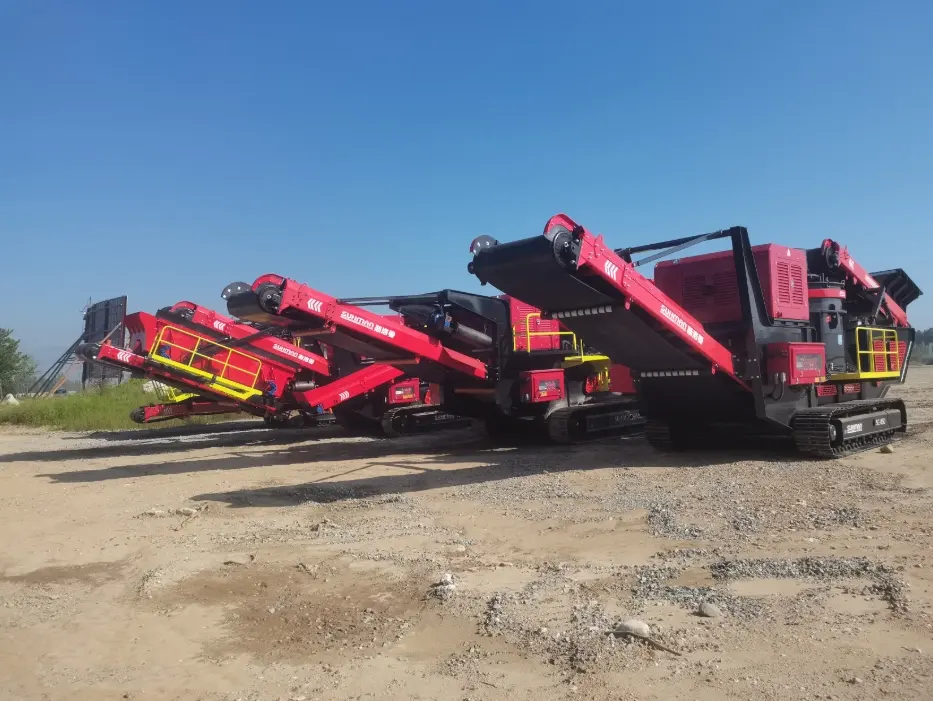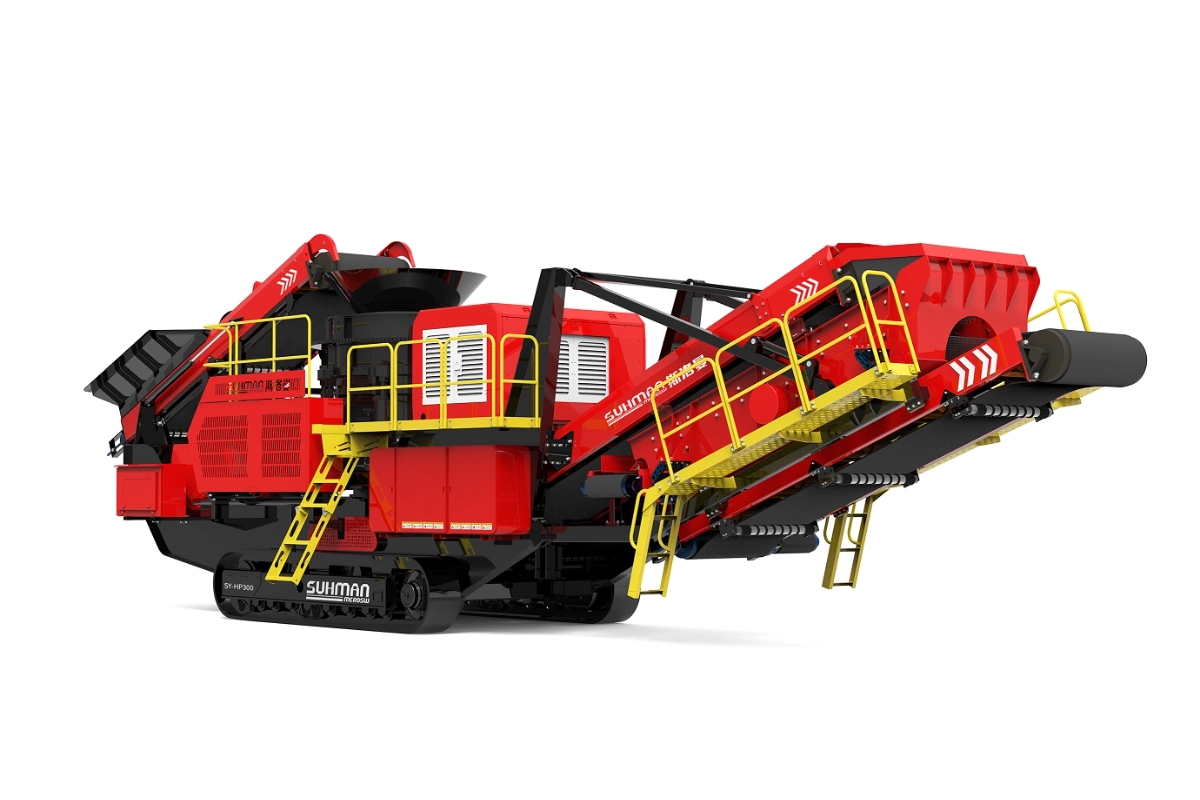How Mobile Crushing Plants Are Revolutionizing Construction Site Operations
Release time: 2024-12-19
In today’s rapidly evolving construction industry, efficiency, cost-effectiveness, and sustainability are more important than ever. As demand for infrastructure grows, traditional construction methods for material processing and waste management are being replaced by cutting-edge solutions. One such breakthrough is the mobile crushing plant. These innovative machines are transforming construction operations by enabling on-site material processing, reducing transportation costs, improving recycling efforts, and boosting project efficiency.

What is a Mobile Crushing Plant?
A mobile crushing plant is a portable and versatile machine designed to crush and process materials such as concrete, asphalt, rocks, gravel, and other aggregates directly at the construction site. Unlike traditional stationary crushers, mobile crushers are highly flexible, allowing them to be easily moved across different locations, which is crucial for large-scale construction and demolition projects.
These plants typically consist of a primary crusher, secondary crushers, screening units, conveyors, and other key components—all mounted on a single chassis for easy relocation. Depending on the site’s needs, mobile crushing units come in various configurations, including tracked and wheeled models, offering solutions for different terrains and project types.
Key Benefits of Mobile Crushing Plants in Construction
- Enhanced Efficiency and Speed
Mobile crushing plants significantly improve the efficiency and speed of construction projects. Traditional crushing methods require transporting raw materials to a stationary plant, which can be time-consuming and costly. With a mobile crushing plant, construction teams can process materials on-site, drastically reducing transport time, logistics costs, and overall project delays. The result is faster completion of projects, leading to more efficient use of time and resources.
- Cost-Effective Material Processing
One of the standout features of mobile crushing plants is their cost-effectiveness. By eliminating the need to transport materials to off-site plants, mobile crushers help businesses save on transportation costs. Moreover, recycled materials, such as crushed concrete and asphalt, can be reused directly at the site, lowering the need for new raw materials and further reducing project costs.
- Eco-Friendly and Sustainable Solutions
Sustainability is a growing concern in the construction industry, and mobile crushing plants contribute significantly to reducing the industry’s environmental impact. These crushers help minimize construction waste by facilitating on-site recycling. Old concrete and asphalt can be processed and reused, reducing landfill waste and the need to extract new raw materials, which helps reduce a project’s carbon footprint.
- Versatility and Flexibility in Applications
Mobile crushing plants offer remarkable versatility and can process a wide variety of materials, including concrete, asphalt, rock, gravel, and more. Whether it’s for road construction, building demolition, or quarrying, mobile crushers are adaptable to meet the demands of different projects. Tracked mobile crushers are particularly suited for rough terrains, while wheeled crushers excel on flatter, more accessible sites. This adaptability ensures that mobile crushers can handle a broad range of construction needs.
- Time-Saving Features for Increased Productivity
Mobile crushing plants are engineered to deliver high throughput, processing large volumes of material in a short amount of time. By handling material crushing directly at the construction site, mobile crushers eliminate delays that would otherwise occur from transporting materials to stationary plants. The result is reduced project timelines and an increase in overall productivity.
- Improved Safety on Construction Sites
Safety is a top priority on any construction site, and mobile crushers help reduce risks. By combining several tasks—such as material crushing, screening, and sorting—into a single unit, mobile crushers reduce the need for multiple pieces of equipment, lowering the number of operators needed. Additionally, dust suppression systems, protective barriers, and other built-in safety features help ensure a safer working environment.
Common Applications of Mobile Crushing Plants
Mobile crushing plants are versatile tools widely used in the construction sector. Below are some common applications where these crushers make a significant impact:
- Concrete Recycling: Demolition projects generate significant quantities of concrete waste. Instead of hauling it off-site, mobile crushers can crush concrete on-site, transforming it into reusable material for future projects, saving both time and money.
- Asphalt Recycling: Asphalt from old roads and pavements can be processed with mobile crushers, converting it into material that can be reused in road construction or for resurfacing projects. This asphalt recycling process is eco-friendly and cost-effective.
- Road Construction: For road construction, mobile crushers are essential for producing high-quality aggregates like crushed rock, gravel, and sand. They allow construction companies to produce these materials on-demand at the job site, saving time and transportation costs.
- Building Demolition: Mobile crushers play a pivotal role in building demolition projects. They efficiently break down concrete, metals, and other debris, enabling recycling of valuable materials and reducing waste that would otherwise go to landfills.
The Future of Mobile Crushing Plants
As the construction industry moves towards more sustainable practices, mobile crushing plant technology continues to evolve. Some notable trends include:
- Automation and Smart Features: Advanced mobile crushing plants are integrating AI (artificial intelligence) for features like predictive maintenance and automated operations. This innovation minimizes downtime, enhances performance, and reduces manual intervention.
- Electric-Powered Crushers: With the growing emphasis on reducing carbon footprints, mobile crushing plants powered by electric motors or battery technology could become more common. These crushers are quieter, more efficient, and eco-friendly compared to traditional diesel-powered models.
- Advanced Recycling Capabilities: Future mobile crushers may incorporate better sorting and recycling mechanisms, improving the recovery of materials from construction waste and increasing the amount of reusable material. This will drive the growth of a more circular economy in construction.
Conclusion
Mobile crushing plants are transforming the way the construction industry approaches material processing. These portable crushers offer numerous advantages, including cost savings, enhanced efficiency, environmental sustainability, and improved project timelines. By enabling on-site material recycling, reducing transportation needs, and producing high-quality aggregates, mobile crushing plants are becoming a critical component of modern construction. As technology continues to advance, the role of mobile crushers in sustainable construction practices will only continue to grow.
.png)
.png)


 />
/> />
/>